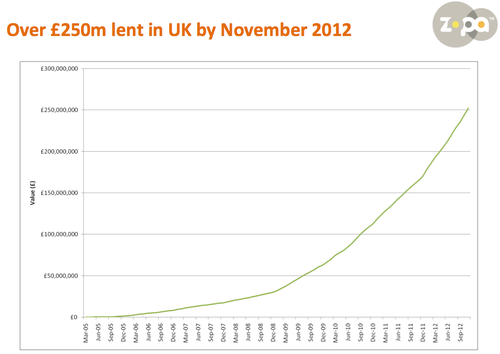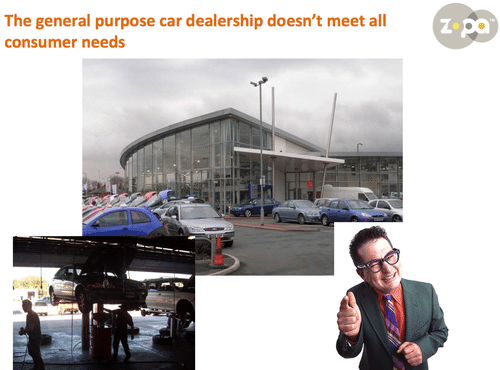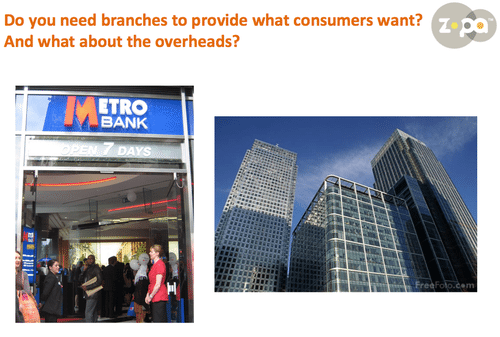
Giles Andrews, Chief Executive of Zopa, recently spoke at the Financial Services Club, London, and has kindly provided me with his script and slides to share with y'all so, here it is ...
Thanks very
much to Chris and Andy for asking me back and to all of you for coming to
listen. I hope most of you know a little
about what we do but, for those who don’t, here’s a slide that explains it
pretty simply.

By cutting
out banks we provide better value to consumers who are sensible with their money – lower cost loans on one side, and
better returns on their savings on the other.
Before I
prepared something for tonight I had a look at what I have said here before, on
the small chance that anyone would actually come and listen to me again. So I’m not going to talk about the origins of
the idea. I’m obviously happy to do that
over a glass of wine later.
Firstly, I’m
going to give you an update on how we’re doing; secondly, I want to talk about
innovation; and thirdly, and perhaps most controversially in this setting I’m
afraid, I want to talk about culture and its impact on trust. It may mean I’m not invited back, but I hope
not, as it’s meant to stimulate thinking and discussion!
So now for
that update. Chris always wants to know
how we’re growing and I want to make some announcements tonight the first of which is
that we have lent over £250m now, or a
quarter of a billion pounds as my PR people tell me to say.

I’m jumping the gun slightly as we will
actually hit the milestone on Friday, but I thought I could get away with it in
this company.
So now we’ve
got that out of the way I’m going to talk about innovation. This has been an issue in financial services for
a long time, well before the crisis.
We all know
the story about the ATM being the biggest financial innovation in recent times.
As Paul Volcker, former Chairman of the US Federal Reserve, said in the Wall Street Journal, 8th December 2009: “...the most important financial
innovation that I have seen the past 20 years is the automatic teller
machine...”
That's it?
One of my favourite stories comes from a different sector and this one is relevant to banks when we think about genuine consumer value focussed innovation.
Forty years
ago, garage workshops were located (as they still are) in large, usually flashy
“general” dealerships in inconvenient places.

The
aftersales product sold (not the one customers thought they were buying) was
labour, and all jobs had a labour component.
These labour
charges were high, allegedly to support the highly trained mechanics and to pay
for the expensive facilities.
I understand
the top labour rates within the London area have now broken through £200 per
hour, or about the same as you pay a junior city solicitor or accountant.
The easiest
way to run these businesses was to organise a workflow from all the jobs of the
day and, as customers couldn’t be trusted to bring their vehicles in, to
organise that workflow once all the jobs were booked in.
That meant
all the customers dropping their cars off in the morning leading, of course, to
queues at the counter.
Customers
then had to somehow get to their place of work from the inconveniently located
dealership, only to have to repeat that mission at the end of the day, and pay
over the odds for often trivial work.
But someone
thought of a better way to handle part (importantly
not all) of this £8 billion UK aftersales market.
In 1971 a
young entrepreneur called Tom Farmer was on holiday in the USA, after selling
his first business.
He noticed
the “muffler shops” there with interest.
Some
aftersales jobs didn’t need skilled mechanics or smart facilities. Some
of the parts to be supplied had terrifically high margins and could be fitted
very fast.
The KwikFit
operation he started in the UK had a genuinely different business model.
They didn’t
seek to replace full service garages, but only to steal the bits of their
business they could do better, offering more convenience and better value to their customers.
Full service
garages now don’t sell any tyres or exhausts.
The whole
business worth over £1 billion per year - or 15% of their business - has gone, never
to be replaced.
The customer
gets to go to a convenient location on a High Street, at a time of his
choosing, while paying less for the service.
No wonder these
businesses enjoyed stratospheric growth and Tom Farmer became a very wealthy
man.
The parallel
with Zopa is that we have developed a lower cost model for a small part of
banking.
Why is it a
lower cost model?
We offer
unsecured personal loans and a simple savings or investment product.
Because the
loans are fixed length, we can easily match their maturities with the savings
product, and provide our lenders with a decent and predictable return. But we
couldn’t offer current accounts or credit cards, as we couldn’t pay our lenders
a return on unused facilities without becoming a bank with a complex treasury
function. Because the loans are
unsecured we don’t need lots of admin, and the resulting high overheads, to
manage the security.
In terms of
running the business, our job is to make sure that returns are safe and
reliable by screening the applicants and spreading each lender’s risk across
many different borrowers.
We have
therefore built most, but importantly not all, of the functions of a typical
bank, including managing credit and risk. And we have done that better than any other UK
lender, with defaults below 0.8% of the quarter
of a billion pounds we have lent to date. And we have done it profitably since 2011, so
are proud to be a self-sustaining business.
Now back to
retail banking.

I keep being
struck by hearing bankers talking about the strengths of the branch model, and
the importance of their customer “relationships”.
I heard a
presentation by a high profile new entrant talking about the strong economics
of deposits taken by branches, as customers apparently value service and
relationship above rate.
So the
question becomes: how does that compete with a model that provides both service
and value?
We are told
of the “stickiness” of deposits taken at branches during the credit crisis
versus internet deposits like at ING Direct.
In other
words, banks treat branch customers as either stupider or lazier than online
banking customers, since they didn’t remove their funds to the same
extent.
So how about
addressing the problem of making internet deposits sticky, as we have by
matching the maturities of the savings and loan products, while saving the
costs of the branch network?
A recent
survey by the American Bankers Association found that 57% of customers over the
age of 55 prefer to do their banking online, yet banks continue to invest
vastly more in developing their branch offerings than their internet and mobile
channels, which are sub-standard in terms of service, perversely driving some
consumers back to the branches and reinforcing the delusion that’s what
customers want!
Our view is
that most consumers want value above all else, and I think the winners will be
those who focus on that and not a flawed “relationship”.
And that
brings me on to the subject of culture and its impact on trust.
We hear a
lot about banks needing to restore trust and that’s pretty well it. We don’t
hear about why they have lost it and what they propose to do about it. It’s as if the words are enough. It’s some kind of PR issue that they just
need to work through. Well, even if that
were the case, what are the golden rules for dealing with PR crises?
- admit the problem, in full, no weasel
words; - say sorry, you understand how people
feel; - say it may even get worse before it
gets better so you look really honest; - say what you are going to do about it;
and - say sorry again.
Compare that
to what have we had here: “There has been a global financial crisis (it’s not our fault); we understand that
has led to people not trusting us (nothing
about what they have done to cause that); so we recognise we need to
rebuild trust (nothing about how) … and
then everything will be back to normal.
Let me be
clear, this is not just a PR problem. It’s far more fundamental than that. I think it’s a culture problem not a trust
problem at its root, although the loss of trust is clearly a consequence.
Let me give
you a few examples.
I was kindly
invited to dinner with some leading UK retail bankers. I won’t name names but suffice it to say
there were UK heads of most of them. Our
host asked what they thought had caused the loss of trust, and they answered:
- the USA; and
- investment banks flawed business
models and misaligned bonus structures.
They were
very clear it was nothing to do with UK retail banking.
When I
politely mentioned PPI, the biggest financial mis-selling scandal in UK history
and entirely retail bank based, there was some nervous coughing and fidgeting.
Then would
you believe the answer?
It was the
previous discredited and now-departed management at their banks what done it.
The irony is
“now-departed” in these cases actually often meant to another of the banks in
the room, so in effect some of them were blaming other regimes in the room that
were also passing the buck!
You really
couldn’t make it up.
It was also
the previous sales incentives, now changed of course, although they did admit the
new ones were still commission or bonus based in large part.
I’m sure
those incentive structures did play a major part, but those structures were
driven by the culture of the organisation, and that culture somehow forgot the
importance of the customer!
Throughout
this period the FSA had a regulatory standard called “Treating Customers Fairly”,
which was evidently about as much use as a chocolate teapot in the face of the
overwhelming culture of profits at all cost.
Another
retail (or at least not investment) banking example, and I’m sorry to name
names here, is the “alleged” failure of HSBC to perform reasonable anti-money laundering
checks in Mexico and, rather closer to home, the Channel Islands, resulting in
it “allegedly” dealing with known criminals.
Or from our
very own Chris Skinner’s fine blog recently, their decision to exit the Money
Services Business with only 30 days notice, not giving long standing customers
the chance to find alternatives.
Or ING
pulling out of equipment leasing at a few days notice.
At least that
was to the benefit of one of my P2P colleagues Funding Circle, but again with no
thought to customers.
Or to move
to investment banking, perhaps the clearest example of forgetting the customer
is the enormous conflict of interest caused by betting against your own
customer in the derivatives markets, for which major banks have accepted fines
if not blame.
Back to my
PR crisis lesson, everyone really knows they did it. And do I need to mention LIBOR?
So what to
do?
Firstly,
challenge the assumption of economies of scale.
I commend to
you an article in the Economist a couple of weeks ago challenging the
assumption across many industries, with banking at the forefront.
I would
assert that the economy of scale “enjoyed” by the big banks was all to do with
funding costs and look where that got us: cheap money looking for a home in
ever bigger bets...
The mistake
is now being repeated by governments and, if you strip it out, I think you
would find the big banks are less and not more efficient.
If this simple
business fact was transparent, the egregious “too big to fail” problem would go
away of its own accord, stimulating more competition.
For
consumers and tax payers, what’s not to like about that?
Indeed Andy
Haldane (he’s a fan of Zopa and P2P by the way, as mentioned in the invitation
tonight) said recently he would set the cap at a surprisingly low level versus
Barclays and RBS balance sheets of £1.5 trillion.
Secondly,
challenge the assumption of cross border economies.
With the
exception of a handful of global equity and fixed income trading businesses,
and some outliers like VISA, MasterCard and PayPal, I don’t think there’s much
positive evidence for them.
That removes
the business case for most of the “bulge bracket” investment banks, again
helping to solve the “too big to fail” problem.
Maybe the
old partnership model that was dispensed with in the pursuit of scale was
simply better?
Thirdly,
banks need to actually do something positive about addressing their culture. My contention is that they haven’t to
date.
They could
start by designing products and services that provide genuine value, put the
customer and not their P&L first, that customers like and tell their
friends about.
I’m not
advocating some kind of altruistic nirvana, as some of the most successful and profitable
companies put customer enjoyment and experience first. Apple and Zappos spring to mind.
I’ll never
forget a lesson from my first job, which was that the customer pays my wages.
I’m not
going to get into the regulatory debate, there are others much better qualified;
suffice it to say that I hope, perhaps unrealistically, that the banking review
does lead to increased competition. And
I do expect P2P lending to be regulated one day.
I’m happy to
discuss that further in Q&A if anyone is interested.
So where
does that leave Zopa and our growing P2P sector?
I hope I
have made the case for increased efficiency through a narrow business
model.
I was at
another dinner recently, this time hosted by Chris Skinner, where the most
common question was “can it scale”?
I believe
that the efficiency of our business model will allow us and our competitors to
scale in our particular sector more than the banks – now there’s a
promise!
Fortunately
we aren’t the only people to believe it, so I’m delighted to make my second
announcement of the night: now that we have proven all aspects of the model –
it provides great value to our savers and borrowers, profitably for us - we
have secured a new round of multi-million pound funding through equity investment in Zopa to help scale and
critically to build awareness of our business.
Thank you.
Chris M Skinner
Chris Skinner is best known as an independent commentator on the financial markets through his blog, TheFinanser.com, as author of the bestselling book Digital Bank, and Chair of the European networking forum the Financial Services Club. He has been voted one of the most influential people in banking by The Financial Brand (as well as one of the best blogs), a FinTech Titan (Next Bank), one of the Fintech Leaders you need to follow (City AM, Deluxe and Jax Finance), as well as one of the Top 40 most influential people in financial technology by the Wall Street Journal's Financial News. To learn more click here...

